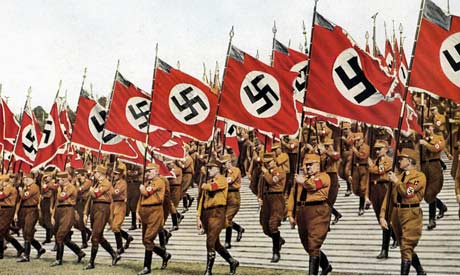Franz Josef Haydn was generally an excellent guy. He was born into a lower-class family and clawed his way up the ranks of musicianship, jobbing for whoever needed a substitute or an extra instrument and even busking occasionally. He might not have been the most creative composer in the universe, but he was honest, genial, loved musical pranks and was good to his employees. Haydn is considered the father of the symphony and the string quartet, offspring which place him pretty high on the list of Awesome Things From Austria.
Not on the list: Hitler, Conrad von Hötzendorf, Falco |
Once he had reached success and security, Haydn spent a lot of time in England. During that time, however, he noticed that the British had something Austria lacked—a kickass (or kiss-ass, depending on how you feel about monarchies) song about the head of state.
So he wrote one in 1797. It looked like this:
If the kaiser is named anything other than Franz, we're screwed. |
Franz Josef was extremely proud of this song, which was used as the Austro-Hungarian Empire's national anthem until it finally dissolved from an excess of suck in 1918. As an old man, he often sat down at his piano and plunked it out at least once a day. He also made it the basis for his “Emperor” string quartet, which is quite beautiful. I'd love to have played it in the high school string quartet, but we were all blond and blue-eyed. This fact will become important later.
A couple of decades after the melody was written, the poet August Heinrich Hoffman von Fallersleben wrote some alternate lyrics for it...
Deutschland, Deutschland über alles, Über alles in der Welt, Wenn es stets zu Schutz und Trutze Brüderlich zusammenhält. Von der Maas bis an die Memel, Von der Etsch bis an den Belt, |: Deutschland, Deutschland über alles, Über alles in der Welt! :| |
The first stanza, stolen from Wikipedia because I'm lazy
You thought of this, didn't you?
You totally did. Don't even lie. |
In other words, you thought of "Germany is superior to everything in the world" rather than "Germany is greater than the sum of its parts". When Hoffman wrote the words, “Germany” as we recognize it today was a bunch of shitty little nation-states--usually pushed around by Austria or Prussia--that constituted the confused remains of the Holy Roman Empire. They were loosely connected by a German Confederation that varied in functionality (indeed, in existence) over time. So when someone said "Germany" in a nationalist sense, they were probably speaking in linguistic terms.
Hoffman was actually advocating the very LIBERAL political goal of a single unified German-speaking state loyal to the rule of law rather than to a monarch. His ideas were so revolutionary at the time that he lost his job and had to go into hiding until the Revolutions of 1848.
His lyrics, combined with Haydn's tune, became the German national anthem in 1922.
The Nazis, along with pretty much everything else they did, perverted the meaning of Hoffman's poem into something more aligned with their ideology. The brilliant thing was that they didn't even have to change any words. They just left out the other verses about "unity and justice and freedom", because who needs 'em.
So there you go. The revolutionary liberal behind Deutschland über Alles is turning in his grave.
The current German national anthem is actually the third verse (the one about unity and justice and freedom), but the connotations are still there for many people.
Note: This DOES NOT make the Deutschlandlied any different from any other reasonably old anthem. They’ve all whored themselves out at some point to purposes besides national glory. I’ll write about Russia’s anthem(s) later on, when I’ve introduced you to the Red Army Chorus and can adequately contain my fangirl.
.jpg)

Hallo! I came across your blog through the "FirstWorldWarProblems" which is absolutely amazing. I wanted to say hello. As a (currently nomadic) Hungarian, I might disagree with your Austria-Hungary having an excess of suck. ;)
ReplyDeleteIf I ever hear the German anthem, I am usually in my head singing "gott erhalte franz den kaiser" but only a small amount of the chorus as I don't speak German and the Hungarian version is rarely ever ever heard (the Czech version was popular in its time, but we never played our translation because it was just too reminding of Austrian dominance.)
The anthem was changed slightly every time there was a new kaiser- the last version "gott erhalte karl den kaiser, unser guten kaiser karl." This was not often such a problem though considering the number of people named Franz. Even I have a great grandfather, Ferenc.
Also. I love Red Army Choir. But maybe you have not heard this, so I will introduce you....
http://www.youtube.com/watch?v=J8z7vELrotc&feature=related
If the link does not work, simply look for "zengjük a dalt" and you will find it. :)
I realise this is an old post, but if you see this, then good to meet you, Riet.